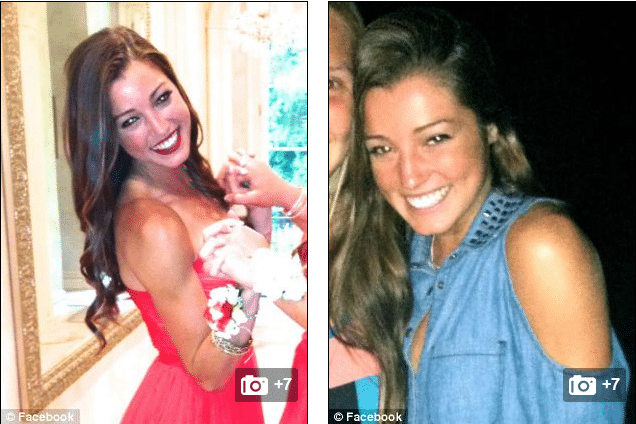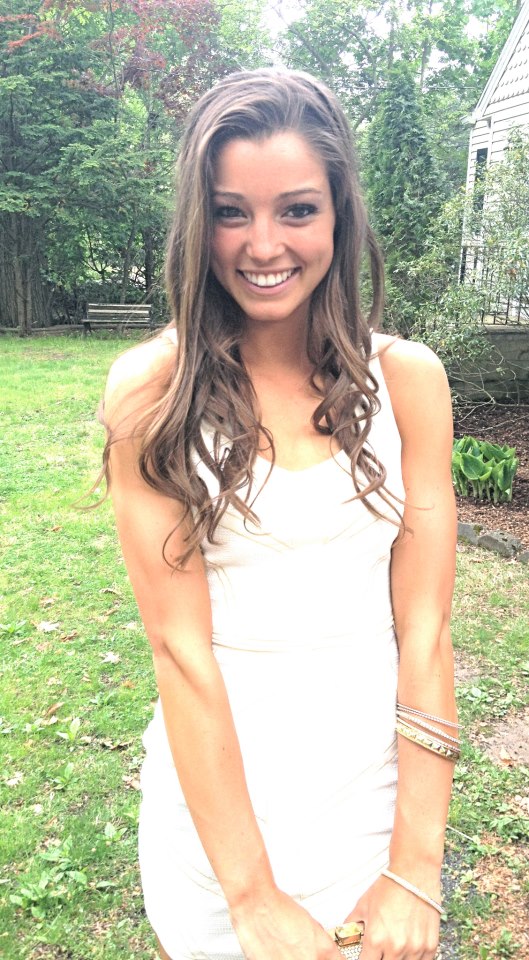
Since the death of Madison Holleran, questions have been asked as to what may have drawn the seemingly happy 19 year old University of Penn student to commit suicide.
According to her father, James Holleran, 52, the illustrious track and athlete star had recently communicated that she had been having suicidal thoughts as recent as this past December.
Reflecting on what could have inspired his daughter to take her life, James Holleran opined that the stress of maintaining academic and athletic standards had begun to wear on his daughter who by now was widely seen as largely infallible off the back of winning illustrious athletic awards and her academic prowess.
Told Madison Holleran’s father:
‘There was a lot more pressure in the classroom at Penn,’
‘She wasn’t normal happy Madison. Now she had worries and stress.’

Yet whilst authorities have yet to tell what may have being the triggering moment that led to Madison Holleran taking her life, questions are raised as to the extent depression may have had a role in the young woman taking her life or as one commentator on the web reflected the competition factor in society which these days holds many captive.
Reflected one commentator: Kids today are pushed to the point of no return, it’s all about competition. Kids don’t enjoy themselves anymore. It’s what our pathetic society has become. Penn is an elitist school, and I will just leave it at that. “Normal” kids do not go to Penn. It is a dog eat dog world, and we have to find another definition of “success” for our younger generation. Extremely sad, but certainly not surprising. Her entire life was a competition, her grades, her athletic ability, her beauty, enough already. Even the most loving and supportive parents can’t protect their child from the pressure of today’s society. She was caught up in the big game, the perpetual longing for unattainable, impossible perfection.
Could it be then the unrelenting pressure of attaining perfection, looking the part, being the part, academically, athletically that may have brought Madison Holleran to despair as she was seen as infallible despite increasing feelings of self doubt and perhaps reticence of continually being in the spotlight?

At the risk of insensitivity, many commentators have opined that the reason Madison Holleran’s death has garnered so much attention from the press is as one commentator put it:
‘Whenever a hot girl dies, part of the universe does too.’
Where as another commentator reflected that the issue would be a non event had ‘she been an ugly girl.’
Perhaps this comments alone point to some degree of irony inherent in Madison Holleran’s life. She was seen as the perennially beautiful no can do wrong girl and yet she felt so wrong inside and worse was unable to let those feelings out. She was held to a standard that even the infallible Madison Holleran could no longer maintain as the demands of school, of being the uber athlete became omnipresent. And rather than accepting it was fine to make mistakes, to not always look her best, or to be first, one young woman took society’s demands on her too heart.
Rather than accepting Madison Holleran’s humanity in life, ironically the young woman has managed to command it only through death….
Madison Holleran suicide note: ‘I was locked in.’
Why was Madison Holleran ashamed to admit mental illness?
Madison Holleran funeral. Was she on anti depressants?
Madison Holleran death: Is her school to blame?
Madison Holleran father: ‘My daughter needed help.’
Why did Madison Holleran commit suicide?










PART OF BEING AN ADULT IS LEARNING TO SAY “**** OFF” THE PEOPLE HASSLING YOU ! NO ONE’S WORTH TAKING YOUR LIFE OVER IMO R.I.P. MADISON 🙁
Can’t you people just let her rest in peace and not fight and argue about stuff you didn’t know. And i agree with what you have to say Nik
nobody knows Maddy and why she did this so just leave it at that
You are using this tragedy to rally against the pharmaceutical giants and their dispensaries. This is not the forum for that. Please get off the soapbox and take it somewhere else. This isn’t what I want to read as commentary. It’s redundant and adds nothing to the mystery and sadness surrounding Madison’s story. I get it. You think meds are bad.
You ended your comment with some arrogance as well
God forbid we tell someone they’re beautiful… Chances are she was revered for her athletic and academic abilities just as often.
Nope. Athletes at Ivy League schools still need to maintain high honor roll grades and have standardized test scores in the highest percentiles (in high school). And the fact that they can excel in their sport while doing this further suggests that they can compete. While their athletic abilities do help them gain admission, they still need to be elite in the classroom.
Blah, blah, blah. “What most people can’t understand is that, at UPenn and schools like it, the “superior” or “exceptional” student–such as I was–quickly discovers that we are not all that unusual.” Blah blah…
As I stated in a previous posting:
“The, minimum, “academic cred,” that you speak of will not get anyone into Penn unless that student is an athlete, well connected, or a PC/charity case, and unless the student is one of these, will certainly not illicit the forthcoming of financial assistance adequate to pay his tuition.”
Said the person addicted to drugs…
Honesty takes a huge part in this discussion. I think whoever said if she would not have been pretty, it would not have attracted so much attention. I remember in high school when a girl in my class killed herself. Although, she did not have many friends and usually kept to herself, I remember no one caring because people did not even know who she was. Imagine if she played sports, was the “hottest” girl around like Maddy was. Society is ruining people and their minds. You’d think people would stop after someone’s life was taken. I feel like people want to follow in the motion of taking their own life because to them, it could seem like the right thing to do and that it is ok. It is NOT ok. Some take their life for granted and some do not value it at all. Life occurs once, live it day by day.
Unless you actually know her, and were inside her head at the time, all your opinions are just theories. The only person who can tell you why is unfortunately dead. Perhaps if people had stopped judging her (like most of you are doing now) and analyising how she SHOULD feel and actually talked to her instead of trying to shove anti-depressants down her throat, she might still be here now. RIP,
this is completely stupid. I go to a so-called “elite” school and I would be dead right now had it not been for my medication and therapy. There IS help out there and these options are breakthroughs…they save many, many lives.
I think your last word in your response here sums it all up; you don’t know what the hell you’re talking about. For someone who has “exceptional gifts” and graduated with a Ph.D. at UPenn, you sure do make a lot of assumptions about a girl whom you only know a few things about through mainstream media.
“It sounds to me like Ms. Holleran had a sense of obligation and responsibility to no one but her perfect image of herself.”
Where the hell is your credible evidence to support this claim? You don’t know her and most importantly, you were not her. You don’t know what she was going through, nor what she was like as a person. I’m glad to hear you are such a strong person and were able to get through a competitive college like a pro, but not everyone is as lucky to be as strong as you are. PLUS, there could have easily been other variables affecting Maddy’s mental health and happiness. For all we know she could have been raped, sexually or physically abused by someone she knew and was too embarrassed or scared to say anything. Perhaps she became pregnant and panicked. Maybe she was dealing with family or friendship drama on the side. Maybe something LIKE this happened, added to the stress she was already dealing with and it became too much for her. For HER, not YOU. I’m sure YOU could have still realized it was something you had to overcome no matter how difficult. But we are talking about MADDY. Not you. You seem to expect everyone to live up to the greatness that is you. YOU sound like the narcissistic one here, the same adjective you carelessly pinned on Maddy and ALL people who commit suicide, regardless of actually knowing her beyond what this article says.
Obviously you still have a HUGE life lesson to learn: Don’t judge others for their actions when you don’t know them and when you’ve no idea what they were truly experiencing. You can compare yourself and your college journey to Maddy’s, but forming judgments about her is flawed because you two are different people and had completely different abilities and experiences.
I just wanted to say, as a very recent penn engineering alum (class of 2013), this comment is probably the best thing I’ve ever seen on the internet. Penn was really hard for me to start out but it was so rewarding. So refreshing to be pushed and expected to fail at first, but being taught to succeed after that failure. Bravo for an excellent analysis, an excellent story! I literally saved your comment on my computer to read again later, it was very inspirational.
Rather than constantly praising gifted/talented kids and telling them how wonderful they are, maybe we should instead tell praise them for their effort, make them realize that they are not perfect, someone will always be better at certain things, and that is okay.
i agree that while we must revere excellence, we must also acknowledge that we are imperfect beings. Even the most brilliant mind has made a mistake or failed, and has learned from it. That’s the only way to grow as an individual. We now live in a narcissistic, impulsive culture. Look at all the instagram pics and facebook and so on, it’s a very “me” generation. This only exacerbates that normal teenage anxiety and insecurity that many face growing into adulthood. Young people seem as though they are always performing, always “on”.
“…and wittingly or unwittingly fed by people who objectify someone like Ms. Holleran as “hot,” “beautiful,” etc. Did no one ever tell or teach her that this is precisely one of the ways that other people express their jackal instinct against strong, intelligent, beautiful women–by dehumanizing and isolating them in a prison of unreal objectification? I thought we had learned that by the 1970s–the perils of making human women into goddesses! It’s what used to be called idolatry.”
FINALLY somebody said it! Why is all the news coverage on Madison talking about how beautiful she was? e.g, this pile of horseshit: http://blog.northjersey.com/varsityaces/29963/madison-holleran-the-girl-in-the-picture/
… I get the sinking feeling that this type of thing comprised a great proportion of the type of feedback this young woman received throughout her life. “You’re beautiful!!!” Not, “great effort on that assignment; or you have excellent work ethic; you have wonderful persistence and drive; you have the ability to do hard things” … the media coverage on Madison seems to focus on her looks. Her athletic ability and her 3.5 GPA seem to be afterthoughts.
I think it’s wildly inappropriate and insensitive to suggest that “she wasn’t smart enough for Penn.” Being a freshman, student athlete at a extremely competitive school would be stressful for even the smartest kid. No one really knows what the cause was for this tragic event, but being kind and sympathetic goes a long way to all those who are mourning the loss of this beautiful young girl.
UPenn is an ELITE school, but not an elitist one. It shares with other Ivy universities the distinction of offering full scholarships to MANY kids like me, who had high IQs and academic/personal/athletic potential, but no money or social/family connections.
I found my years there as a master’s and Ph.D. student to be some of the best of my adult life. My exceptional gifts were recognized and nurtured, but also put into context, requiring me to take a hard look at what I could and could not expect to offer to and achieve for society, others, and myself. I was expected to learn to mentor myself, not depend on others for that. I was expected to discover, and embrace, my flaws and limits.
I also taught undergrads while at UPenn, and I met about a dozen like Ms. Holleran. Life had been so easy, sheltered, and programmed for them that their first encounter with something outside the fast track to perfect success really threw them.
I didn’t have that problem; Penn accepted me, a poor kid from a violent ghetto, reeling from loss of my father in my teens and crushed by my responsibilities to my dysfunctional family. Penn saw me for the gifts I had that were going unexercised and unvalued, it reached out to me…and made all the difference in how my life unfolded. Only one professor ever treated me like an “affirmative action case,” and I rejected that treatment. Penn’s excellence was life’s blood for me, coming as I did from such familial, social, and cultural dysfunction. I had to overcome so much every day of my life, so failure was nothing new to me.
But I understand her grief. I faced something like that at 19, when I was a student at a fifth-rate college in my ghetto city. I learned (thanks to my teacher, a UPenn Ph.D.) that the first test of being a good human is to always find a reason to go on, ESPECIALLY when one has all the benefits and privileges in the world, and to keep going on because others depend on you. There is an element of narcissism in killing oneself, wounding one’s friends and family mortally because one can’t see beyond one’s own ego disappointments. I wish that UPenn’s people had had the time to teach Ms. Holleran that, because I saw it happen for me in grad school there. I passed it along to my undergrad students at Penn who were from very well off families and struggled as she did with perfectionism.
It sounds to me like Ms. Holleran had a sense of obligation and responsibility to no one but her perfect image of herself. That is a monstrous, narcissistic hamartia to permit a child to harbor…and how often would parents of such a “perfect” offspring even observe such a thing in this era, when every child is supposed to be an Einstein Mozart Hawking genius snowflake savior of the earth? And if they observed it, what could they do? Especially when narcissism can be so subtle…
…and wittingly or unwittingly fed by people who objectify someone like Ms. Holleran as “hot,” “beautiful,” etc. Did no one ever tell or teach her that this is precisely one of the ways that other people express their jackal instinct against strong, intelligent, beautiful women–by dehumanizing and isolating them in a prison of unreal objectification? I thought we had learned that by the 1970s–the perils of making human women into goddesses! It’s what used to be called idolatry.
So thus this hurting young person flung herself down from on high, returning to earth in a dreadful way.
I feel sad for her, and all young people who might have similar thoughts. I would only say to them: learning to vanquish those thoughts, to rise above them, is the first duty of a human being. It is the wellspring from which everything else flows. If your parents, teachers, friends, and society didn’t teach you that–and really, they can’t–YOU MUST LEARN IT FOR YOURSELF. It is a boot camp of the soul. The only way out is through.
I feel very sad for her parents, who will be agonizing and second guessing themselves forever, poor dear souls. I knew undergrads at UPenn in various phases of meltdown whose moms and dads were not so understanding as to say, “You can pick another school, honey.”
What most people can’t understand is that, at UPenn and schools like it, the “superior” or “exceptional” student–such as I was–quickly discovers that we are not all that unusual. That’s precisely part of why these institutions exist. There are many kids like us. We can no longer get by on our superiority. That is an important blow and challenge to our egos. But necessary. ***It may be how we learn to have compassion for all those who have even fewer gifts and advantages than we do.*** Being so poor, I went into UPenn with that in place, but saw many people who arrived from privilege, and didn’t.
But what of people who really can’t hack it in that atmosphere of uncompromising excellence?
Well, it’s no different than for those who can: at the end of the day, we have to be willing to accept our limits. It requires maturity, humility, and humor to accomplish that.
How could a “star athlete” not have learned these basic lessons of character? Easily. You see, our society has such ambivalence toward, and even hatred of, excellence. Look at all the snippy comments about UPenn being “arrogant,” “elitist,” etc. The era of political correctness, multiculturalism, moral equivalence, affirmative action, and the rest assert that everyone is a winner. No wonder people Ms. Holleran’s age have no idea that it’s absolutely OK to fall short or even fail! They’ve never been allowed to, never been put in the position to learn that.
Excellence is a magnificent thing. Excellence is not equally distributed. It’s very hard to smack into the wall of one’s limits, for anyone. But that is what the Ivy universities are for: not only cultivating the best of the best, but letting them know that they aren’t all and everything. How sad that this young woman couldn’t let herself learn this most fundamental lesson, and how sad that she has laid such suffering on her family forever. She would have been much happier at Lehigh.
Maybe.
I too was put on anti-depressants in college after depression and severe anxiety.
The medication was amazing for a month but after the original high wears off, you turn into a psycho and when you try and get off of them you turn into a bigger psycho.
I bet she was not taking them routinely and it drove her mad.
These pills fucked up my life.
I agree with the, “are usually not,” sentiment, but even if this particular girl was qualified, the addition of rigorous training and an alien environment and culture may have been enough to push her over the edge.
That said; the fact that she had recently begun taking prescibed medication(s) begs the question of what she was on, and whether it could have contributed to her suicide.
Athletes going to Ivy league schools are usually not the “crem de la crem” as far as brain power is concerned. Yes, they may be above average in a public school, but does that mean that they can compete academically with kids that have been attending elite private schools from the time they were born? Or compete with the Chinese and Indian students who have been reading since they were two years old? Not a chance.
I want to see proof, lab values, etc. for someone who has stress from schoolwork and diagnosed with depression and is subsequently prescribed antidepressants. How can you check someone’s serotonin level, dopamine level? You can’t. How can you REALLY prove that someone is depressed enough for medication, even psychiatrists simply go by answers to questions they ask. How do you know that you need more serotonin????
They now prescribe zoloft for SHINGLES?? Mark my word, sometime in the future we are going to look back and see how much damage overprescribing antidepressants has caused. Antidepressants are not a cure all. Same them for people with true mental illness, oh and I believe only psychiatrists should be prescribing them, not primary care physicians or gynos.
In the Penn bookstore they sell a shirt stating “It’s Penn not Penn State” or something along those arrogant lines, and “It’s Lonely at the Top”. How arrogant can you get? Tons of kids going there wouldn’t be there if their parents weren’t alums and/or loaded.
This girl probably worked harder than you ever have. If she was a spoiled brat, she would not have been a champion.
It’s Penn, not Penn State, and there is no indication that she was not smart enough to attend. Try attending a top school while maintaining the regimen of a top athlete. It’s like working two full time jobs. To make matters worse, Penn’s culture has been alien to that of the prevailing culture’s for decades, so perhaps dealing with people whose ideals ran counter to her own was also weighing upon her.
All I know is that her father’s best hope of helping others may be to disclose what medication she was taking.
How do you know whether or not she was smart enough? People are unable to handle stresses and workloads for various reasons that do not necessarily have anything to do with their intellectual capacities.
Based on reports it seems that she was not taking medication at the time of her death:
“We knew she needed help. She knew she needed help. She had lost confidence in academics and she also lost confidence in her track abilities,” said James, who encouraged his daughter Friday to make an appointment with a therapist who could prescribe her anti-depressant medication.”
http://nypost.com/2014/01/20/dad-track-star-killed-self-over-stress-from-upenn-workload/
It looks like she was going to CONSIDER taking them, but was not taking actually taking them at the time.
She wasn’t smart enough for Penn State and it absolutely ruined an a person very susceptible to mental illness. She should not have gone to an IVY league school it was out of her league.
Not to disparage the deceased, but look at the life of privilege this girl led. Could it possibly be that the bubble of affluence in which she grew up, most likely paired with unrelenting and unanimously positive feedback, left her emotionally unprepared for even the mildest of academic setbacks?
I am well aware of who is and isn’t permitted to prescribe medication, My point is that therapists have no understanding of medications, and yet as you point out, frequently push their patients to seek medication.
As for psychiatrists having any more understanding of these medications, the fact is that they don’t, unless of course they are bio-chemists who have worked in their development. Make no mistake, most doctors’, “understanding,” of these drugs come from the handouts of pharmaceutical reps, which they gloss over as they eat the lunch brought by the rep for their entire office staffs. Sure, they may also attend a seminar or two in between rounds of golf at the Florida resort that they’ve been invited to by a pharmaceutical company, but don’t worry, there is no payola going on behind the curtain as it is perfectly legal to put them on the payroll as consultants.
Such a tragedy. My heart aches for her friends and family.
In regard to @ReggielovesBarry’s comment, I do agree that anti-depressants are not meant to solve the some of the stress in one’s life, but they are most often prescribed in conjunction with cognitive behavioral therapy. Also, some people do have a chemical imbalance, such as those who suffer from clinical depression, where one is biologically incapable of proper serotonin production. Additionally, the average therapist is not the one who prescribes anti-depressants because they are not qualified; they will refer the patient to a psychiatrist who has a medical degree.
Ivy League schools give out, “academic,” scholarships to athletes in order to hide the fact that they do indeed give out scholarships based solely upon athletic ability. That said; she have been academically qualified for Penn, yet unable to balance scholoarship with the rigors of maintaining a regimen designed to keep one’s physical prowess on par with the best of the best, but this is not normal behavior for a healthy, accomplished, and beautiful girl who hails from a loving family.
A few words to the wise… Unless your kids are engaging in absolutely horrendous acts, you may want to keep them away from therapists and the drugs that they push. Too much stress? Remove the stress-causing factor if you can by simply eliminating it from your life. Remember, anti-depressants are meant to mask reality, and often list among other downsides, “suicidal thoughts,” as side effects.
Think about it. Even those who have designed such drugs do not fully understand the workings of the human mind, and the average therapist is a person who barely passed his or her Organic Chemistry courses.